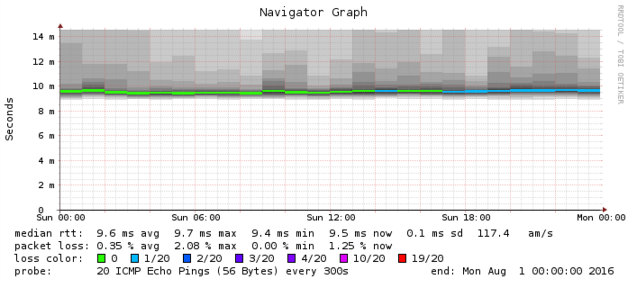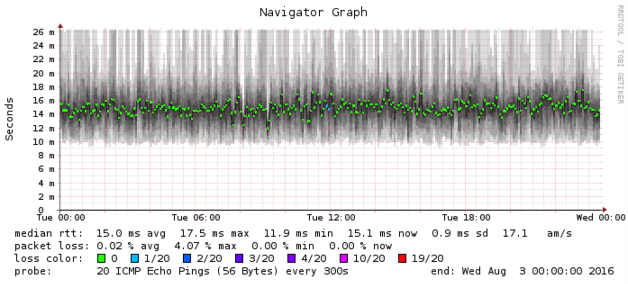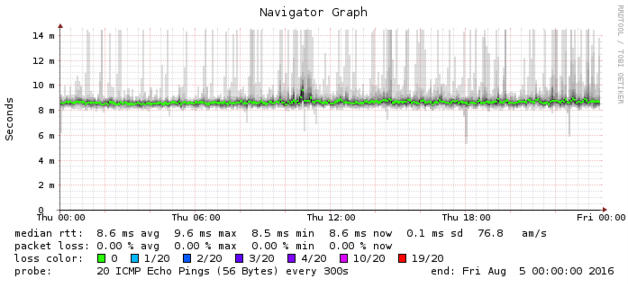Recently, I packaged the
py-lmdb Python binding for the
LMDB database
library. This package is going to be team maintained by the
pkg-db group,
which is responsible for maintaining BerkeleyDB and LMDB packages. Below are my
notes on (re-)Debianizing this package and how the Git repository for the source
package is laid out.
The upstream
py-lmdb developer has a Git-centric workflow. Development is
done on the
master branch, with regular releases done as fast-forward merges
to the
release branch. Release tags of the form
py-lmdb_X.YZ are provided.
The only tarballs provided are the ones that GitHub automatically generates
from tags. Since these tarballs are synthetic and the content of these
tarballs matches the content on the corresponding tag, we will ignore them in
favor of using the release tags directly. (The
--git-pristine-tar-commit
option to
gbp-buildpackage will be used so that
.orig.tar.gz files can be
replicated so that the Debian archive will
accept subsequent uploads,
but tarballs are otherwise irrelevant to our workflow.)
To make it clear that the release tags come from upstream's repository, they
should be prefixed with
upstream/, which would preferably result in a
DEP-14
compliant scheme. (Unfortunately, since upstream's release tags begin with
py-lmdb_, this doesn't quite match the pattern that DEP-14 recommends.)
Here is how the local packaging repository is initialized. Note that
git clone
isn't used, so that we can customize how the tags are fetched. Instead, we
create an empty Git repository and add the upstream repository as the
upstream
remote. The
--no-tags option is used, so that
git fetch does not import the
remote's tags. However, we also add a custom fetch refspec
refs/tags/*:refs/tags/upstream/* so that the remote's tags are explicitly
fetched, but with the
upstream/ prefix.
$ mkdir py-lmdb
$ cd py-lmdb
$ git init
Initialized empty Git repository in /home/edmonds/debian/py-lmdb/.git/
$ git remote add --no-tags upstream https://github.com/dw/py-lmdb
$ git config --add remote.upstream.fetch 'refs/tags/*:refs/tags/upstream/*'
$ git fetch upstream
remote: Counting objects: 3336, done.
remote: Total 3336 (delta 0), reused 0 (delta 0), pack-reused 3336
Receiving objects: 100% (3336/3336), 2.15 MiB 0 bytes/s, done.
Resolving deltas: 100% (1958/1958), done.
From https://github.com/dw/py-lmdb
* [new branch] master -> upstream/master
* [new branch] release -> upstream/release
* [new branch] win32-sparse-patch -> upstream/win32-sparse-patch
* [new tag] last-cython-version -> upstream/last-cython-version
* [new tag] py-lmdb_0.1 -> upstream/py-lmdb_0.1
* [new tag] py-lmdb_0.2 -> upstream/py-lmdb_0.2
* [new tag] py-lmdb_0.3 -> upstream/py-lmdb_0.3
* [new tag] py-lmdb_0.4 -> upstream/py-lmdb_0.4
* [new tag] py-lmdb_0.5 -> upstream/py-lmdb_0.5
* [new tag] py-lmdb_0.51 -> upstream/py-lmdb_0.51
* [new tag] py-lmdb_0.52 -> upstream/py-lmdb_0.52
* [new tag] py-lmdb_0.53 -> upstream/py-lmdb_0.53
* [new tag] py-lmdb_0.54 -> upstream/py-lmdb_0.54
* [new tag] py-lmdb_0.56 -> upstream/py-lmdb_0.56
* [new tag] py-lmdb_0.57 -> upstream/py-lmdb_0.57
* [new tag] py-lmdb_0.58 -> upstream/py-lmdb_0.58
* [new tag] py-lmdb_0.59 -> upstream/py-lmdb_0.59
* [new tag] py-lmdb_0.60 -> upstream/py-lmdb_0.60
* [new tag] py-lmdb_0.61 -> upstream/py-lmdb_0.61
* [new tag] py-lmdb_0.62 -> upstream/py-lmdb_0.62
* [new tag] py-lmdb_0.63 -> upstream/py-lmdb_0.63
* [new tag] py-lmdb_0.64 -> upstream/py-lmdb_0.64
* [new tag] py-lmdb_0.65 -> upstream/py-lmdb_0.65
* [new tag] py-lmdb_0.66 -> upstream/py-lmdb_0.66
* [new tag] py-lmdb_0.67 -> upstream/py-lmdb_0.67
* [new tag] py-lmdb_0.68 -> upstream/py-lmdb_0.68
* [new tag] py-lmdb_0.69 -> upstream/py-lmdb_0.69
* [new tag] py-lmdb_0.70 -> upstream/py-lmdb_0.70
* [new tag] py-lmdb_0.71 -> upstream/py-lmdb_0.71
* [new tag] py-lmdb_0.72 -> upstream/py-lmdb_0.72
* [new tag] py-lmdb_0.73 -> upstream/py-lmdb_0.73
* [new tag] py-lmdb_0.74 -> upstream/py-lmdb_0.74
* [new tag] py-lmdb_0.75 -> upstream/py-lmdb_0.75
* [new tag] py-lmdb_0.76 -> upstream/py-lmdb_0.76
* [new tag] py-lmdb_0.77 -> upstream/py-lmdb_0.77
* [new tag] py-lmdb_0.78 -> upstream/py-lmdb_0.78
* [new tag] py-lmdb_0.79 -> upstream/py-lmdb_0.79
* [new tag] py-lmdb_0.80 -> upstream/py-lmdb_0.80
* [new tag] py-lmdb_0.81 -> upstream/py-lmdb_0.81
* [new tag] py-lmdb_0.82 -> upstream/py-lmdb_0.82
* [new tag] py-lmdb_0.83 -> upstream/py-lmdb_0.83
* [new tag] py-lmdb_0.84 -> upstream/py-lmdb_0.84
* [new tag] py-lmdb_0.85 -> upstream/py-lmdb_0.85
* [new tag] py-lmdb_0.86 -> upstream/py-lmdb_0.86
$
Note that at this point we have content from the upstream remote in our local
repository, but we don't have any local branches:
$ git status
On branch master
Initial commit
nothing to commit (create/copy files and use "git add" to track)
$ git branch -a
remotes/upstream/master
remotes/upstream/release
remotes/upstream/win32-sparse-patch
$
We will use the
DEP-14 naming scheme for the packaging branches, so the
branch for packages targeted at
unstable will be called
debian/sid. Since I
already made an
initial 0.84-1 upload, we need to start the
debian/sid
branch from the upstream 0.84 tag and import the original packaging content
from that upload. The
--no-track flag is passed to
git checkout initially
so that Git doesn't consider the upstream release tag
upstream/py-lmdb_0.84
to be the upstream branch for our packaging branch.
$ git checkout --no-track -b debian/sid upstream/py-lmdb_0.84
Switched to a new branch 'debian/sid'
$
At this point I imported the original packaging content for 0.84-1 with
git am. Then, I signed the
debian/0.84-1 tag:
$ git tag -s -m 'Debian release 0.84-1' debian/0.84-1
$ git verify-tag debian/0.84-1
gpg: Signature made Sat 04 Jul 2015 02:49:42 PM EDT using RSA key ID AAF6CDAE
gpg: Good signature from "Robert Edmonds <edmonds@mycre.ws>" [ultimate]
gpg: aka "Robert Edmonds <edmonds@fsi.io>" [ultimate]
gpg: aka "Robert Edmonds <edmonds@debian.org>" [ultimate]
$
New upstream releases are integrated by fetching new upstream tags and
non-fast-forward merging into the packaging branch. The latest release is 0.86,
so we merge from the
upstream/py-lmdb_0.86 tag.
$ git fetch upstream --dry-run
[...]
$ git fetch upstream
[...]
$ git checkout debian/sid
Already on 'debian/sid'
$ git merge --no-ff --no-edit upstream/py-lmdb_0.86
Merge made by the 'recursive' strategy.
ChangeLog 46 ++++++++++++++
docs/index.rst 46 +++++++++++++-
docs/themes/acid/layout.html 4 +-
examples/dirtybench-gdbm.py 6 ++
examples/dirtybench.py 19 ++++++
examples/nastybench.py 18 ++++--
examples/parabench.py 6 ++
lib/lmdb.h 37 ++++++-----
lib/mdb.c 281 ++++++++++++++++++++++++++++++++++++++++++++++++++++++++++++---------------------
lib/midl.c 2 +-
lib/midl.h 2 +-
lib/py-lmdb/preload.h 48 ++++++++++++++
lmdb/__init__.py 2 +-
lmdb/cffi.py 120 ++++++++++++++++++++++++-----------
lmdb/cpython.c 86 +++++++++++++++++++------
lmdb/tool.py 5 +-
misc/gdb.commands 21 ++++++
misc/runtests-travisci.sh 3 +-
misc/runtests-ubuntu-12-04.sh 28 ++++----
setup.py 2 +
tests/crash_test.py 22 +++++++
tests/cursor_test.py 37 +++++++++++
tests/env_test.py 73 +++++++++++++++++++++
tests/testlib.py 14 +++-
tests/txn_test.py 20 ++++++
25 files changed, 773 insertions(+), 175 deletions(-)
create mode 100644 lib/py-lmdb/preload.h
create mode 100644 misc/gdb.commands
$
Here I did some additional development work like editing the
debian/gbp.conf
file and applying a fix for
#790738 to make the package build reproducibly.
The package is now ready for an
0.86-1 upload, so I ran the following
gbp dch command:
$ gbp dch --release --auto --new-version=0.86-1 --commit
gbp:info: Found tag for topmost changelog version '6bdbb56c04571fe2d5d22aa0287ab0dc83959de5'
gbp:info: Continuing from commit '6bdbb56c04571fe2d5d22aa0287ab0dc83959de5'
gbp:info: Changelog has been committed for version 0.86-1
$
This automatically generates a changelog entry for 0.86-1, but it includes
commit summaries for all of the upstream commits since the last release, which I
had to edit out.
Then, I used
gbp buildpackage with
BUILDER=pbuilder to build the package in
a clean, up-to-date
sid chroot. After checking the result, I signed the
debian/0.86-1 tag:
$ git tag -s -m 'Debian release 0.86-1' debian/0.86-1
$
The package is now ready to be pushed to
git.debian.org. First, a
bare
repository is initialized:
$ ssh git.debian.org
edmonds@moszumanska:~$ cd /srv/git.debian.org/git/pkg-db/
edmonds@moszumanska:/srv/git.debian.org/git/pkg-db$ umask 002
edmonds@moszumanska:/srv/git.debian.org/git/pkg-db$ mkdir py-lmdb.git
edmonds@moszumanska:/srv/git.debian.org/git/pkg-db$ cd py-lmdb.git/
edmonds@moszumanska:/srv/git.debian.org/git/pkg-db/py-lmdb.git$ git --bare init --shared
Initialized empty shared Git repository in /srv/git.debian.org/git/pkg-db/py-lmdb.git/
edmonds@moszumanska:/srv/git.debian.org/git/pkg-db/py-lmdb.git$ echo 'py-lmdb Debian packaging' > description
edmonds@moszumanska:/srv/git.debian.org/git/pkg-db/py-lmdb.git$ mv hooks/post-update.sample hooks/post-update
edmonds@moszumanska:/srv/git.debian.org/git/pkg-db/py-lmdb.git$ chmod a+x hooks/post-update
edmonds@moszumanska:/srv/git.debian.org/git/pkg-db/py-lmdb.git$ logout
Shared connection to git.debian.org closed.
Then, we add a new
debian remote to our local packaging repository. Per our
repository conventions, we need to ensure that only branch names matching
debian/* and
pristine-tar and tag names matching
debian/* and
upstream/* are pushed to the
debian remote when we run
git push debian,
so we add a a set of
remote.debian.push refspecs that correspond to these
conventions. We also add an explicit
remote.debian.fetch refspec to fetch
tags.
$ git remote add debian ssh://git.debian.org/git/pkg-db/py-lmdb.git
$ git config --add remote.debian.push 'refs/tags/debian/*'
$ git config --add remote.debian.push 'refs/tags/upstream/*'
$ git config --add remote.debian.push 'refs/heads/debian/*'
$ git config --add remote.debian.push 'refs/heads/pristine-tar'
$ git config --add remote.debian.fetch 'refs/tags/*:refs/tags/*'
We now run the initial push to the remote Git repository. The
--set-upstream
option is used so that our local branches will be configured to track the
corresponding remote branches. Also note that the
debian/* and
upstream/*
tags are pushed as well.
$ git push debian --set-upstream
Counting objects: 3333, done.
Delta compression using up to 8 threads.
Compressing objects: 100% (1083/1083), done.
Writing objects: 100% (3333/3333), 1.37 MiB 0 bytes/s, done.
Total 3333 (delta 2231), reused 3314 (delta 2218)
To ssh://git.debian.org/git/pkg-db/py-lmdb.git
* [new branch] pristine-tar -> pristine-tar
* [new branch] debian/sid -> debian/sid
* [new tag] debian/0.84-1 -> debian/0.84-1
* [new tag] debian/0.86-1 -> debian/0.86-1
* [new tag] upstream/last-cython-version -> upstream/last-cython-version
* [new tag] upstream/py-lmdb_0.1 -> upstream/py-lmdb_0.1
* [new tag] upstream/py-lmdb_0.2 -> upstream/py-lmdb_0.2
* [new tag] upstream/py-lmdb_0.3 -> upstream/py-lmdb_0.3
* [new tag] upstream/py-lmdb_0.4 -> upstream/py-lmdb_0.4
* [new tag] upstream/py-lmdb_0.5 -> upstream/py-lmdb_0.5
* [new tag] upstream/py-lmdb_0.51 -> upstream/py-lmdb_0.51
* [new tag] upstream/py-lmdb_0.52 -> upstream/py-lmdb_0.52
* [new tag] upstream/py-lmdb_0.53 -> upstream/py-lmdb_0.53
* [new tag] upstream/py-lmdb_0.54 -> upstream/py-lmdb_0.54
* [new tag] upstream/py-lmdb_0.56 -> upstream/py-lmdb_0.56
* [new tag] upstream/py-lmdb_0.57 -> upstream/py-lmdb_0.57
* [new tag] upstream/py-lmdb_0.58 -> upstream/py-lmdb_0.58
* [new tag] upstream/py-lmdb_0.59 -> upstream/py-lmdb_0.59
* [new tag] upstream/py-lmdb_0.60 -> upstream/py-lmdb_0.60
* [new tag] upstream/py-lmdb_0.61 -> upstream/py-lmdb_0.61
* [new tag] upstream/py-lmdb_0.62 -> upstream/py-lmdb_0.62
* [new tag] upstream/py-lmdb_0.63 -> upstream/py-lmdb_0.63
* [new tag] upstream/py-lmdb_0.64 -> upstream/py-lmdb_0.64
* [new tag] upstream/py-lmdb_0.65 -> upstream/py-lmdb_0.65
* [new tag] upstream/py-lmdb_0.66 -> upstream/py-lmdb_0.66
* [new tag] upstream/py-lmdb_0.67 -> upstream/py-lmdb_0.67
* [new tag] upstream/py-lmdb_0.68 -> upstream/py-lmdb_0.68
* [new tag] upstream/py-lmdb_0.69 -> upstream/py-lmdb_0.69
* [new tag] upstream/py-lmdb_0.70 -> upstream/py-lmdb_0.70
* [new tag] upstream/py-lmdb_0.71 -> upstream/py-lmdb_0.71
* [new tag] upstream/py-lmdb_0.72 -> upstream/py-lmdb_0.72
* [new tag] upstream/py-lmdb_0.73 -> upstream/py-lmdb_0.73
* [new tag] upstream/py-lmdb_0.74 -> upstream/py-lmdb_0.74
* [new tag] upstream/py-lmdb_0.75 -> upstream/py-lmdb_0.75
* [new tag] upstream/py-lmdb_0.76 -> upstream/py-lmdb_0.76
* [new tag] upstream/py-lmdb_0.77 -> upstream/py-lmdb_0.77
* [new tag] upstream/py-lmdb_0.78 -> upstream/py-lmdb_0.78
* [new tag] upstream/py-lmdb_0.79 -> upstream/py-lmdb_0.79
* [new tag] upstream/py-lmdb_0.80 -> upstream/py-lmdb_0.80
* [new tag] upstream/py-lmdb_0.81 -> upstream/py-lmdb_0.81
* [new tag] upstream/py-lmdb_0.82 -> upstream/py-lmdb_0.82
* [new tag] upstream/py-lmdb_0.83 -> upstream/py-lmdb_0.83
* [new tag] upstream/py-lmdb_0.84 -> upstream/py-lmdb_0.84
* [new tag] upstream/py-lmdb_0.85 -> upstream/py-lmdb_0.85
* [new tag] upstream/py-lmdb_0.86 -> upstream/py-lmdb_0.86
Branch pristine-tar set up to track remote branch pristine-tar from debian.
Branch debian/sid set up to track remote branch debian/sid from debian.
$
After the initial push, we need to configure the remote repository so that
clones will checkout the
debian/sid branch by default:
$ ssh git.debian.org
edmonds@moszumanska:~$ cd /srv/git.debian.org/git/pkg-db/py-lmdb.git/
edmonds@moszumanska:/srv/git.debian.org/git/pkg-db/py-lmdb.git$ git symbolic-ref HEAD refs/heads/debian/sid
edmonds@moszumanska:/srv/git.debian.org/git/pkg-db/py-lmdb.git$ logout
Shared connection to git.debian.org closed.
We can check if there are any updates in upstream's Git repository with the
following command:
$ git fetch upstream --dry-run -v
From https://github.com/dw/py-lmdb
= [up to date] master -> upstream/master
= [up to date] release -> upstream/release
= [up to date] win32-sparse-patch -> upstream/win32-sparse-patch
= [up to date] last-cython-version -> upstream/last-cython-version
= [up to date] py-lmdb_0.1 -> upstream/py-lmdb_0.1
= [up to date] py-lmdb_0.2 -> upstream/py-lmdb_0.2
= [up to date] py-lmdb_0.3 -> upstream/py-lmdb_0.3
= [up to date] py-lmdb_0.4 -> upstream/py-lmdb_0.4
= [up to date] py-lmdb_0.5 -> upstream/py-lmdb_0.5
= [up to date] py-lmdb_0.51 -> upstream/py-lmdb_0.51
= [up to date] py-lmdb_0.52 -> upstream/py-lmdb_0.52
= [up to date] py-lmdb_0.53 -> upstream/py-lmdb_0.53
= [up to date] py-lmdb_0.54 -> upstream/py-lmdb_0.54
= [up to date] py-lmdb_0.56 -> upstream/py-lmdb_0.56
= [up to date] py-lmdb_0.57 -> upstream/py-lmdb_0.57
= [up to date] py-lmdb_0.58 -> upstream/py-lmdb_0.58
= [up to date] py-lmdb_0.59 -> upstream/py-lmdb_0.59
= [up to date] py-lmdb_0.60 -> upstream/py-lmdb_0.60
= [up to date] py-lmdb_0.61 -> upstream/py-lmdb_0.61
= [up to date] py-lmdb_0.62 -> upstream/py-lmdb_0.62
= [up to date] py-lmdb_0.63 -> upstream/py-lmdb_0.63
= [up to date] py-lmdb_0.64 -> upstream/py-lmdb_0.64
= [up to date] py-lmdb_0.65 -> upstream/py-lmdb_0.65
= [up to date] py-lmdb_0.66 -> upstream/py-lmdb_0.66
= [up to date] py-lmdb_0.67 -> upstream/py-lmdb_0.67
= [up to date] py-lmdb_0.68 -> upstream/py-lmdb_0.68
= [up to date] py-lmdb_0.69 -> upstream/py-lmdb_0.69
= [up to date] py-lmdb_0.70 -> upstream/py-lmdb_0.70
= [up to date] py-lmdb_0.71 -> upstream/py-lmdb_0.71
= [up to date] py-lmdb_0.72 -> upstream/py-lmdb_0.72
= [up to date] py-lmdb_0.73 -> upstream/py-lmdb_0.73
= [up to date] py-lmdb_0.74 -> upstream/py-lmdb_0.74
= [up to date] py-lmdb_0.75 -> upstream/py-lmdb_0.75
= [up to date] py-lmdb_0.76 -> upstream/py-lmdb_0.76
= [up to date] py-lmdb_0.77 -> upstream/py-lmdb_0.77
= [up to date] py-lmdb_0.78 -> upstream/py-lmdb_0.78
= [up to date] py-lmdb_0.79 -> upstream/py-lmdb_0.79
= [up to date] py-lmdb_0.80 -> upstream/py-lmdb_0.80
= [up to date] py-lmdb_0.81 -> upstream/py-lmdb_0.81
= [up to date] py-lmdb_0.82 -> upstream/py-lmdb_0.82
= [up to date] py-lmdb_0.83 -> upstream/py-lmdb_0.83
= [up to date] py-lmdb_0.84 -> upstream/py-lmdb_0.84
= [up to date] py-lmdb_0.85 -> upstream/py-lmdb_0.85
= [up to date] py-lmdb_0.86 -> upstream/py-lmdb_0.86
We can check if any co-maintainers have pushed updates to the
git.debian.org
repository with the following command:
$ git fetch debian --dry-run -v
From ssh://git.debian.org/git/pkg-db/py-lmdb
= [up to date] debian/sid -> debian/debian/sid
= [up to date] pristine-tar -> debian/pristine-tar
= [up to date] debian/0.84-1 -> debian/0.84-1
= [up to date] debian/0.86-1 -> debian/0.86-1
= [up to date] upstream/last-cython-version -> upstream/last-cython-version
= [up to date] upstream/py-lmdb_0.1 -> upstream/py-lmdb_0.1
= [up to date] upstream/py-lmdb_0.2 -> upstream/py-lmdb_0.2
= [up to date] upstream/py-lmdb_0.3 -> upstream/py-lmdb_0.3
= [up to date] upstream/py-lmdb_0.4 -> upstream/py-lmdb_0.4
= [up to date] upstream/py-lmdb_0.5 -> upstream/py-lmdb_0.5
= [up to date] upstream/py-lmdb_0.51 -> upstream/py-lmdb_0.51
= [up to date] upstream/py-lmdb_0.52 -> upstream/py-lmdb_0.52
= [up to date] upstream/py-lmdb_0.53 -> upstream/py-lmdb_0.53
= [up to date] upstream/py-lmdb_0.54 -> upstream/py-lmdb_0.54
= [up to date] upstream/py-lmdb_0.56 -> upstream/py-lmdb_0.56
= [up to date] upstream/py-lmdb_0.57 -> upstream/py-lmdb_0.57
= [up to date] upstream/py-lmdb_0.58 -> upstream/py-lmdb_0.58
= [up to date] upstream/py-lmdb_0.59 -> upstream/py-lmdb_0.59
= [up to date] upstream/py-lmdb_0.60 -> upstream/py-lmdb_0.60
= [up to date] upstream/py-lmdb_0.61 -> upstream/py-lmdb_0.61
= [up to date] upstream/py-lmdb_0.62 -> upstream/py-lmdb_0.62
= [up to date] upstream/py-lmdb_0.63 -> upstream/py-lmdb_0.63
= [up to date] upstream/py-lmdb_0.64 -> upstream/py-lmdb_0.64
= [up to date] upstream/py-lmdb_0.65 -> upstream/py-lmdb_0.65
= [up to date] upstream/py-lmdb_0.66 -> upstream/py-lmdb_0.66
= [up to date] upstream/py-lmdb_0.67 -> upstream/py-lmdb_0.67
= [up to date] upstream/py-lmdb_0.68 -> upstream/py-lmdb_0.68
= [up to date] upstream/py-lmdb_0.69 -> upstream/py-lmdb_0.69
= [up to date] upstream/py-lmdb_0.70 -> upstream/py-lmdb_0.70
= [up to date] upstream/py-lmdb_0.71 -> upstream/py-lmdb_0.71
= [up to date] upstream/py-lmdb_0.72 -> upstream/py-lmdb_0.72
= [up to date] upstream/py-lmdb_0.73 -> upstream/py-lmdb_0.73
= [up to date] upstream/py-lmdb_0.74 -> upstream/py-lmdb_0.74
= [up to date] upstream/py-lmdb_0.75 -> upstream/py-lmdb_0.75
= [up to date] upstream/py-lmdb_0.76 -> upstream/py-lmdb_0.76
= [up to date] upstream/py-lmdb_0.77 -> upstream/py-lmdb_0.77
= [up to date] upstream/py-lmdb_0.78 -> upstream/py-lmdb_0.78
= [up to date] upstream/py-lmdb_0.79 -> upstream/py-lmdb_0.79
= [up to date] upstream/py-lmdb_0.80 -> upstream/py-lmdb_0.80
= [up to date] upstream/py-lmdb_0.81 -> upstream/py-lmdb_0.81
= [up to date] upstream/py-lmdb_0.82 -> upstream/py-lmdb_0.82
= [up to date] upstream/py-lmdb_0.83 -> upstream/py-lmdb_0.83
= [up to date] upstream/py-lmdb_0.84 -> upstream/py-lmdb_0.84
= [up to date] upstream/py-lmdb_0.85 -> upstream/py-lmdb_0.85
= [up to date] upstream/py-lmdb_0.86 -> upstream/py-lmdb_0.86
$
We can check if anything needs to be pushed from our local repository to the
git.debian.org repository with the following command:
$ git push debian --dry-run -v
Pushing to ssh://git.debian.org/git/pkg-db/py-lmdb.git
To ssh://git.debian.org/git/pkg-db/py-lmdb.git
= [up to date] debian/sid -> debian/sid
= [up to date] pristine-tar -> pristine-tar
= [up to date] debian/0.84-1 -> debian/0.84-1
= [up to date] debian/0.86-1 -> debian/0.86-1
= [up to date] upstream/last-cython-version -> upstream/last-cython-version
= [up to date] upstream/py-lmdb_0.1 -> upstream/py-lmdb_0.1
= [up to date] upstream/py-lmdb_0.2 -> upstream/py-lmdb_0.2
= [up to date] upstream/py-lmdb_0.3 -> upstream/py-lmdb_0.3
= [up to date] upstream/py-lmdb_0.4 -> upstream/py-lmdb_0.4
= [up to date] upstream/py-lmdb_0.5 -> upstream/py-lmdb_0.5
= [up to date] upstream/py-lmdb_0.51 -> upstream/py-lmdb_0.51
= [up to date] upstream/py-lmdb_0.52 -> upstream/py-lmdb_0.52
= [up to date] upstream/py-lmdb_0.53 -> upstream/py-lmdb_0.53
= [up to date] upstream/py-lmdb_0.54 -> upstream/py-lmdb_0.54
= [up to date] upstream/py-lmdb_0.56 -> upstream/py-lmdb_0.56
= [up to date] upstream/py-lmdb_0.57 -> upstream/py-lmdb_0.57
= [up to date] upstream/py-lmdb_0.58 -> upstream/py-lmdb_0.58
= [up to date] upstream/py-lmdb_0.59 -> upstream/py-lmdb_0.59
= [up to date] upstream/py-lmdb_0.60 -> upstream/py-lmdb_0.60
= [up to date] upstream/py-lmdb_0.61 -> upstream/py-lmdb_0.61
= [up to date] upstream/py-lmdb_0.62 -> upstream/py-lmdb_0.62
= [up to date] upstream/py-lmdb_0.63 -> upstream/py-lmdb_0.63
= [up to date] upstream/py-lmdb_0.64 -> upstream/py-lmdb_0.64
= [up to date] upstream/py-lmdb_0.65 -> upstream/py-lmdb_0.65
= [up to date] upstream/py-lmdb_0.66 -> upstream/py-lmdb_0.66
= [up to date] upstream/py-lmdb_0.67 -> upstream/py-lmdb_0.67
= [up to date] upstream/py-lmdb_0.68 -> upstream/py-lmdb_0.68
= [up to date] upstream/py-lmdb_0.69 -> upstream/py-lmdb_0.69
= [up to date] upstream/py-lmdb_0.70 -> upstream/py-lmdb_0.70
= [up to date] upstream/py-lmdb_0.71 -> upstream/py-lmdb_0.71
= [up to date] upstream/py-lmdb_0.72 -> upstream/py-lmdb_0.72
= [up to date] upstream/py-lmdb_0.73 -> upstream/py-lmdb_0.73
= [up to date] upstream/py-lmdb_0.74 -> upstream/py-lmdb_0.74
= [up to date] upstream/py-lmdb_0.75 -> upstream/py-lmdb_0.75
= [up to date] upstream/py-lmdb_0.76 -> upstream/py-lmdb_0.76
= [up to date] upstream/py-lmdb_0.77 -> upstream/py-lmdb_0.77
= [up to date] upstream/py-lmdb_0.78 -> upstream/py-lmdb_0.78
= [up to date] upstream/py-lmdb_0.79 -> upstream/py-lmdb_0.79
= [up to date] upstream/py-lmdb_0.80 -> upstream/py-lmdb_0.80
= [up to date] upstream/py-lmdb_0.81 -> upstream/py-lmdb_0.81
= [up to date] upstream/py-lmdb_0.82 -> upstream/py-lmdb_0.82
= [up to date] upstream/py-lmdb_0.83 -> upstream/py-lmdb_0.83
= [up to date] upstream/py-lmdb_0.84 -> upstream/py-lmdb_0.84
= [up to date] upstream/py-lmdb_0.85 -> upstream/py-lmdb_0.85
= [up to date] upstream/py-lmdb_0.86 -> upstream/py-lmdb_0.86
Everything up-to-date
Finally, in order to set up a fresh local clone of the
git.debian.org
repository that's configured like the local repository created above, we have
to do the following:
$ git clone --origin debian ssh://git.debian.org/git/pkg-db/py-lmdb.git
Cloning into 'py-lmdb'...
remote: Counting objects: 3333, done.
remote: Compressing objects: 100% (1070/1070), done.
remote: Total 3333 (delta 2231), reused 3333 (delta 2231)
Receiving objects: 100% (3333/3333), 1.37 MiB 1.11 MiB/s, done.
Resolving deltas: 100% (2231/2231), done.
Checking connectivity... done.
$ cd py-lmdb
$ git remote add --no-tags upstream https://github.com/dw/py-lmdb
$ git config --add remote.upstream.fetch 'refs/tags/*:refs/tags/upstream/*'
$ git fetch upstream
remote: Counting objects: 56, done.
remote: Total 56 (delta 25), reused 25 (delta 25), pack-reused 31
Unpacking objects: 100% (56/56), done.
From https://github.com/dw/py-lmdb
* [new branch] master -> upstream/master
* [new branch] release -> upstream/release
* [new branch] win32-sparse-patch -> upstream/win32-sparse-patch
$ git branch --track pristine-tar debian/pristine-tar
Branch pristine-tar set up to track remote branch pristine-tar from debian.
$ git config --add remote.debian.push 'refs/tags/debian/*'
$ git config --add remote.debian.push 'refs/tags/upstream/*'
$ git config --add remote.debian.push 'refs/heads/debian/*'
$ git config --add remote.debian.push 'refs/heads/pristine-tar'
$ git config --add remote.debian.fetch 'refs/tags/*:refs/tags/*'
$
This is a fair amount of effort beyond a simple
git clone, though, so I
wonder if anything can be done to optimize this.
 It didn't drop packets at random, though. Some traffic would be
deterministically dropped, such as the parallel A/AAAA DNS lookups generated by
the glibc DNS stub resolver. For instance, in the following
It didn't drop packets at random, though. Some traffic would be
deterministically dropped, such as the parallel A/AAAA DNS lookups generated by
the glibc DNS stub resolver. For instance, in the following  It seemed unlikely that Arris would fix the firmware issues in the SB6190 before
the end of my 30-day return window, so I returned the SB6190 and purchased a
Netgear CM600. This modem appears to be based on the Broadcom BCM3384 and
looking at an older release of the CM600 firmware source reveals that the
device runs the open source eCos embedded operating system.
The Netgear CM600 so far hasn't exhibited any of the issues I found with the
Arris SB6190 modem. Here is a SmokePing graph for the CM600, which shows median
latency about 1 ms lower than the Arris modem:
It seemed unlikely that Arris would fix the firmware issues in the SB6190 before
the end of my 30-day return window, so I returned the SB6190 and purchased a
Netgear CM600. This modem appears to be based on the Broadcom BCM3384 and
looking at an older release of the CM600 firmware source reveals that the
device runs the open source eCos embedded operating system.
The Netgear CM600 so far hasn't exhibited any of the issues I found with the
Arris SB6190 modem. Here is a SmokePing graph for the CM600, which shows median
latency about 1 ms lower than the Arris modem:
 It's not clear which company is to blame for the problems in the Arris modem.
Looking at the DOCSIS drivers in the SB6190 firmware source reveals copyright
statements from ARRIS Group, Texas Instruments, and Intel. However, I would
recommend avoiding cable modems produced by Arris in particular, and cable
modems based on the Intel Puma SoC in general.
It's not clear which company is to blame for the problems in the Arris modem.
Looking at the DOCSIS drivers in the SB6190 firmware source reveals copyright
statements from ARRIS Group, Texas Instruments, and Intel. However, I would
recommend avoiding cable modems produced by Arris in particular, and cable
modems based on the Intel Puma SoC in general.
 It didn't drop packets at random, though. Some traffic would be
deterministically dropped, such as the parallel A/AAAA DNS lookups generated by
the glibc DNS stub resolver. For instance, in the following
It didn't drop packets at random, though. Some traffic would be
deterministically dropped, such as the parallel A/AAAA DNS lookups generated by
the glibc DNS stub resolver. For instance, in the following  It seemed unlikely that Arris would fix the firmware issues in the SB6190 before
the end of my 30-day return window, so I returned the SB6190 and purchased a
Netgear CM600. This modem appears to be based on the Broadcom BCM3384 and
looking at an older release of the CM600 firmware source reveals that the
device runs the open source eCos embedded operating system.
The Netgear CM600 so far hasn't exhibited any of the issues I found with the
Arris SB6190 modem. Here is a SmokePing graph for the CM600, which shows median
latency about 1 ms lower than the Arris modem:
It seemed unlikely that Arris would fix the firmware issues in the SB6190 before
the end of my 30-day return window, so I returned the SB6190 and purchased a
Netgear CM600. This modem appears to be based on the Broadcom BCM3384 and
looking at an older release of the CM600 firmware source reveals that the
device runs the open source eCos embedded operating system.
The Netgear CM600 so far hasn't exhibited any of the issues I found with the
Arris SB6190 modem. Here is a SmokePing graph for the CM600, which shows median
latency about 1 ms lower than the Arris modem:
 It's not clear which company is to blame for the problems in the Arris modem.
Looking at the DOCSIS drivers in the SB6190 firmware source reveals copyright
statements from ARRIS Group, Texas Instruments, and Intel. However, I would
recommend avoiding cable modems produced by Arris in particular, and cable
modems based on the Intel Puma SoC in general.
It's not clear which company is to blame for the problems in the Arris modem.
Looking at the DOCSIS drivers in the SB6190 firmware source reveals copyright
statements from ARRIS Group, Texas Instruments, and Intel. However, I would
recommend avoiding cable modems produced by Arris in particular, and cable
modems based on the Intel Puma SoC in general.
 I've lately been working on support for
I've lately been working on support for
 What happened in the
What happened in the  Portability toward other systems has been improved: old versions of GNU diff are now supported (Mike McQuaid), suggestion of the appropriate locale is now the more generic
Portability toward other systems has been improved: old versions of GNU diff are now supported (Mike McQuaid), suggestion of the appropriate locale is now the more generic